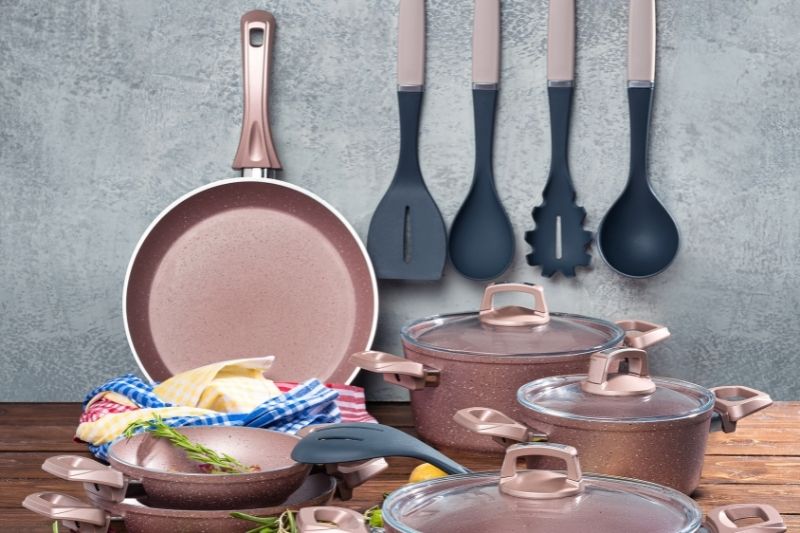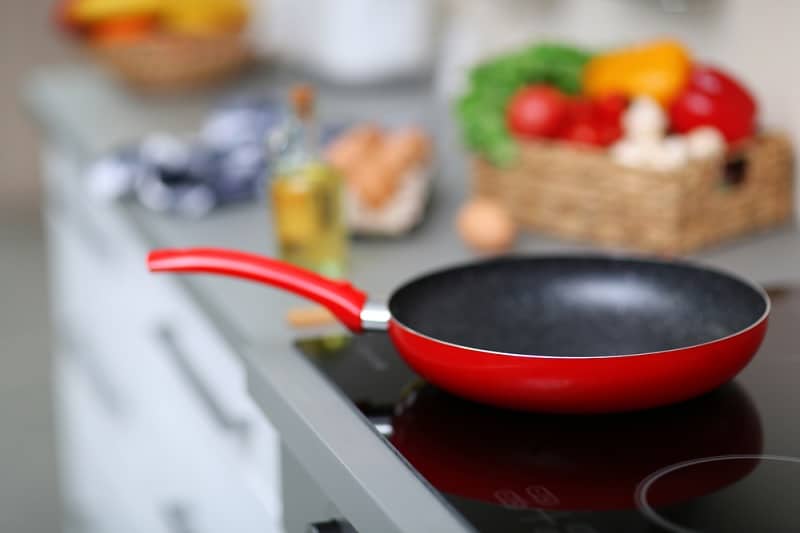In recent years, people have become more aware of the potential health complications of cooking with certain pans. Studies have found that metal ions leach into the food we cook and have effects on the body.
Chemicals are also often used to produce cookware, especially non-stick pans. These too can have carcinogenic properties and adverse health implications.
Titanium is one of the many types of cookware available. But is titanium cookware safe when heated? Or should the health-conscious home cooks opt for a different type of pan?
In this article, we talk in-depth about the safety of titanium cookware and whether they’re the best option for your kitchen.
Is Titanium Metal Safe for Cooking?
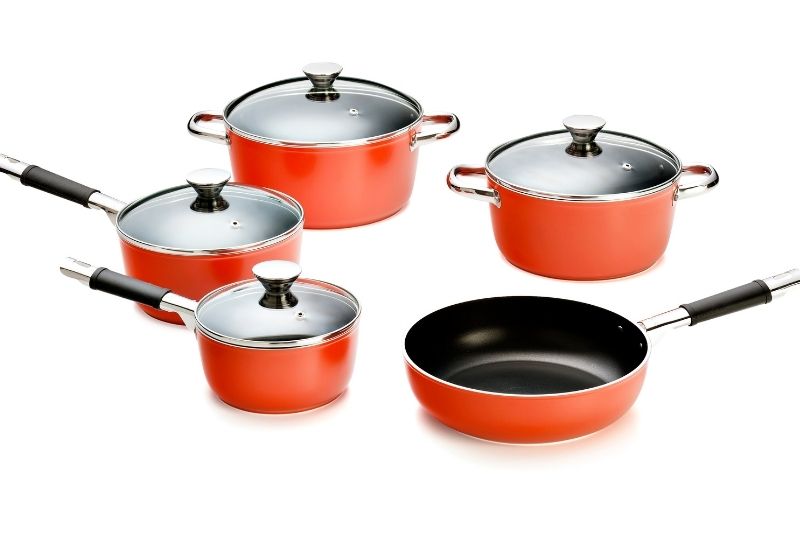
Titanium is generally a safe metal that you can use to cook with confidence. This is because it is non-reactive, meaning it won’t react with heat or food to release potentially dangerous compounds.
With that said, there are several different types of titanium cookware. This includes ceramic titanium cookware, reinforced titanium cookware, and pure titanium cookware.
How safe titanium metal pans are is dependent on which of these three options you are referring to.
Is ceramic titanium cookware safe?
Ceramic titanium cookware has a solid titanium core and is coated in a thin ceramic layer. This ceramic coating gives the pan natural non-stick qualities which make cooking straightforward.
It also reduces the number of fats and oils needed in your recipes. Your meals will be less greasy and more delicious, plus you won’t need to worry about consuming too much oil.
Unfortunately, there has been much debate over the safety of non-stick pans due to the chemical PFOA. However, ceramic titanium pans are a much safer option than PFOA non-stick pans such as Teflon cookware. This is because ceramic is a natural material made from clay.
You can still get the benefits of non-stick cookware without the concerns over ingesting dangerous chemicals and carcinogenic compounds.
Is reinforced titanium cookware safe?
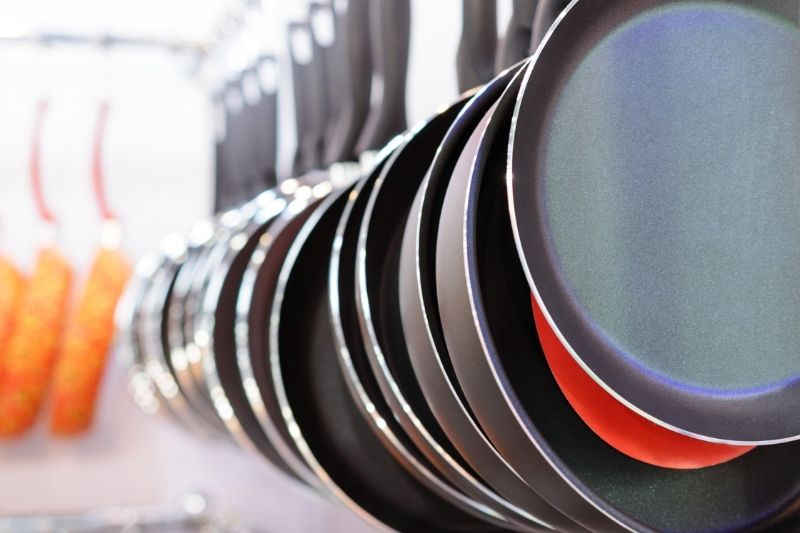
Reinforced titanium cookware is made mainly from aluminium. However, the pans are coated in a titanium-infused ceramic coating. This gives these pans plenty of admirable qualities.
Aluminium is a fantastic conductor of heat which makes it easy to cook food quickly and evenly. The ceramic coating gives the pan natural non-stick properties, while the addition of titanium increases durability.
Like ceramic titanium cookware, reinforced titanium pans are safe when heated. As no chemicals are used, there is no risk of these toxic compounds leaching into your food.
However, aluminium ions can leach into your food if the titanium-infused coating wears away.
There are loose links between increased aluminium and Alzheimer’s disease, which is something to consider. Thankfully, the titanium coating is robust and this shouldn’t be a problem for a long time – if ever!
Is pure titanium cookware safe?
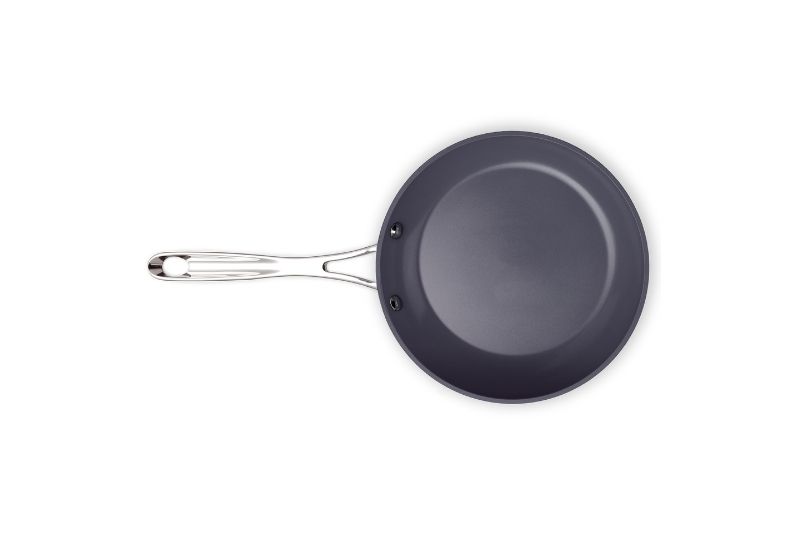
Pure titanium pans are made from 100% titanium. Pure titanium pans without a non-stick coating are arguably one of the safest options to use.
No toxic chemicals have been used in production, and titanium is a robust non-reactive metal that doesn’t readily leach.
This enables you to cook acidic tomato-based foods without worry.
Unfortunately, these pans aren’t great to cook with! Food readily sticks to the surface which makes cleaning hard and cooking even more difficult.
Non-stick pure titanium pans solve this issue and are another safe option. However, steer clear of any pans that aren’t PFOA-free.
PFOA is not currently used in any pans after it was found to be toxic in 2004, so if purchasing new cookware you don’t need to worry.
Yet you should double-check if purchasing second-hard pans made before 2015.
Titanium Cookware Pros and Cons
Health concerns aside, there are many advantages of getting titanium cookware for your kitchen. Below are all the benefits you can get from using these pans for cooking:
- Titanium is an extremely durable metal so cookware lasts a lifetime
- These pans are lightweight and great for people with weaker wrists
- Titanium is a good conductor of heat and cooks food efficiently
- Ceramic titanium pans are scratch-resistant so the non-stick coating lasts nearly forever
- Non-stick titanium pans are easy to clean with water and detergent
- Titanium is a non-reactive metal so will not react with heat and leach into your food
Unfortunately, there are some negatives to titanium cookware. Most notably, titanium pans are expensive. If you are upgrading your cookware on a budget, titanium pans are not a pocket-friendly option at all.
Pure titanium pans also don’t cook food evenly, but this can be overcome by using cookware containing aluminium.
However, where safety is concerned, there are no real complaints to be made whatsoever.

Hannah is a freelance content writer and self-proclaimed foodie. When Hannah isn’t sitting tapping at her laptop, you’ll probably find her in the kitchen. As an ex-chalet host, she’s used to cooking four-course meals for 10+ people and loves feeding friends and family whenever possible.

